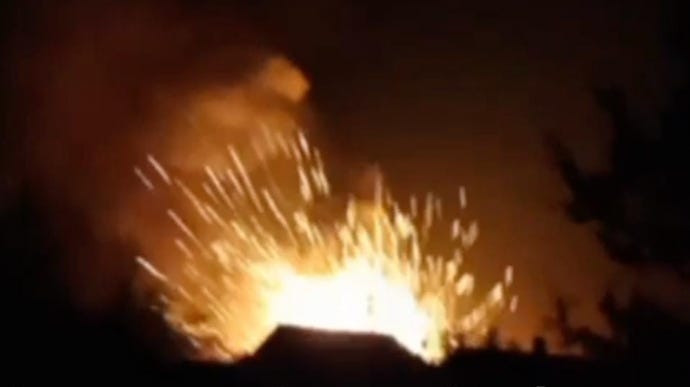Its been just over 3 weeks since the Ukrainians attacked the Russian ammunition storage facility in Toropets. This one attack typified how Ukraine wants to attack Russian military capabilities. It destroyed in one evening the equivalent of 2-3 months of Russian ammunition needs without the loss of a single Ukrainian life. In subsequent weeks, there were reports of Ukrainian attacks against Russian airfields and weapons storage facilities (including for Shaheds) in the Caucasus and that the Ukrainians had hit a storage facility for North Korean systems in Bryansk—leading to a large explosion that might have killed a number of North Koreans now deployed in Russia.Its been just over 3 weeks since the Ukrainians attacked the large Russian ammunition storage facility in Toropets. This one attack typified how Ukraine wants to attack Russian military capabilities. It destroyed in one evening the equivalent of 2-3 months of Russian ammunition needs (according to Estonian intelligence). This is a mind-boggling figure and it occurred without the loss of a single Ukrainian life.
The big question of the time was not the effectiveness of that raid (it was undoubtedly effective) it was whether Ukraine could wage a sustained campaign against Russian logistics, production, etc. Well, the evidence from the subsequent weeks, particularly the last week, is that they are trying very hard to do so. There have been regular reports of Ukrainian ranged attacks against Russian facilities—some of which at least seem to be doing significant damage.
This week, for instance there were reports of Ukrainian attacks against Russian airfields and weapons storage facilities (including for Shaheds) in the Caucasus. Maybe even more interesting, there were reports that the Ukrainians had hit a storage facility for North Korean systems in Bryansk—leading to a large explosion that might have killed a number of North Koreans now deployed in Russia. The Estonians estimated that 6 North Korean officers might have been killed.
And these were only some of the ranged attacks that the Ukrainians have done recently. There were some very striking photographs of a Russian oil storage facility that was hit within occupied Ukraine.
In other words, the Ukrainians believe (as do others) that their hopes for a ranged campaign is showing promise and doing real damage. It is now showing that it can destroy some high value targets, and the loss of ammunition in particular should soon be felt on the battlefield.
However, what the Ukrainians also know is that just with their own systems, such a campaign can only guarantee success against targets that are not so well protected. They need western (particularly US and German—think JASSM, Taurus or ATACMs in large numbers) systems in large numbers, and to be able to use them against military targets in Russia. Systems like the US and German ones have the accuracy and payload to give a much higher percentage chance against targets with extensive Anti-Air defence, or in well-protected bunkers. Ukrainian systems have shown their use, but they are still somewhat limited in capabilities.
Thus the Ukrainians believe that they are showing what they are capable of, but that to realize the true potential of the ranged campaign (which is a key part of their strategy) they need support from their partners—which is not forthcoming.
And this turns the good news into something more bitter. Ukraine is still being aided primarily to fight a front-line war against the large Russian army. Its not a way we would fight, but its the war being forced on Ukraine. This is the kind of war where Russian ability to generate large numbers of basically trained soldiers can have effect—with its slow, micro advances.
The Ukrainians are desperate not to get into this blood exchange on the front lines—and believe that they have a plan not to do so—but even when they show that their plan can worked, they are forced to fight this constrained war.
Oct 14, 2024
Ukrainian Attacks On Russian Ammo Facilities Has Impacted Offensive Capabilities
Shortages of ammunition, drones and other battlefield essentials are slowing Russian attacks by degrading their capabilities.
And these impacts are now being attributed directly to Ukrainian strikes on Russian logistics centers inside Russia and far beyond the front line. Expect them to continue. JL
Phillips O'Brien reports in his substack:





















4 comments:
Excellent post! As asphalt recyclers, we at RC Civil are committed to providing high-quality, sustainable materials. Our paving services are designed to ensure long-lasting, eco-friendly solutions for all your paving needs.
Need reliable AC Services in Bahria Town Phase 6, Islamabad? Professional technicians are available to ensure your air conditioning system is running efficiently with top-tier installation, repair, and maintenance services tailored to your needs.
Post a Comment